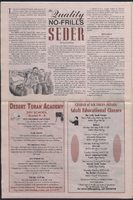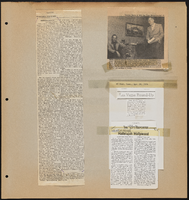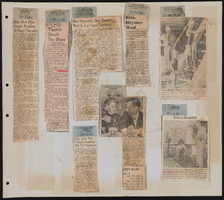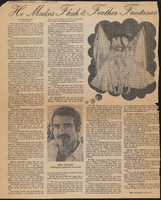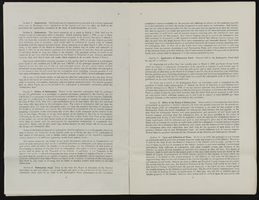Search the Special Collections and Archives Portal
Search Results

Transcript of interview with Jackie Abell by Robert Stuart, April 03, 1976
Date
Archival Collection
Description
Text

Transcript of interview with Thomas Rodriguez by Maribel Estrada Calderón, September 10, 2018
Date
Archival Collection
Description
Known for “raising hell and making a difference” in the Las Vegas Valley, Thomas Rodriguez has dedicated more than four decades of his life to the political, educational, and social advancement of the Latinx community. Tom was born in 1940 to Jennie Gomez and Joseph Rodriguez in a Topeka, Kansas neighborhood its residents called The Bottoms. Mexicans, Mexican Americans, American Indians, African Americans, among other peoples lived in this diverse and beloved community. In 1956, the Urban Renewal Program, a program funded by the Federal Government that sought to raze neighborhoods the city considered to be “slums,” forced The Bottoms’ residents to abandon their homes. Rodriguez recalled the effects that this event had on his family and on his educational career. Despite his family’s relocation, he graduated from a high school located in a nearby neighborhood in 1958. Years later, the activism and ideology of the Chicano Movement of the 1960s taught Rodriguez that to overcome the injus
Text

Transcript of interview with Irving Kirshbaum by Cheryl Rogers, February 23, 1979
Date
Archival Collection
Description
Interview with Irving Kirshbaum by Cheryl Rogers on February 23, 1979. In this interview, Kirshbaum discusses the Riviera Hotel where he began working in 1955. He also talks about the landscape of the Las Vegas Strip in the 1950s, and the state of gambling, comps, customer service, and dealer training. The interviewer asks about the treatment of minorities at the Riviera, and in Las Vegas generally, and the effect of corporate ownership on casinos.
Text
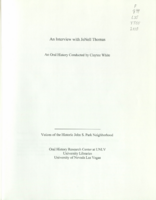
Transcript of interview with JoNell Thomas by Claytee White, January 12, 2010
Date
Archival Collection
Description
JoNell Thomas grew up in a large Utah family, went to Utah State and law school at University of Utah. She moved to Nevada in 1992; first as with the Nevada Supreme Court and then as a staff attorney with a Las Vegas firm, and currently is an attorney with the Clark County Special Public Defender's office. She and her husband, Billy Logan and their twin daughters have lived in the John S. Park Neighborhood since 2001. Their residence was constructed in 1956 on a large corner lot with lots of trees and a fifty-year-old swimming pool. JoNell offers her observations on a variety of JSP events: Stratosphere's failed rollercoaster across the Strip idea; the proposed high-rise complexes; the Monorail lack of convenience to locals; effects of dropping home prices and downturn of economy; the homeless population and closing of Circle Park. She helped create the early online community called the Downtown Neighbors website which provided information regarding , part activist, part pra
Text
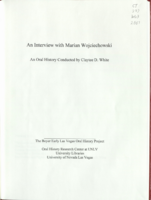
Transcript of interview with Marian Wojciechowski by Claytee White, June 16, 2009
Date
Archival Collection
Description
At age 95, Marian Wojciechowski recalls his personal story of being born a region called called Poland in 1914, just as World War I was beginning. This narrative gives special attention to his Polish background at a time when the country did not technically exist, and their language was forbidden. By the late 1930s and the dawning of World War II, Marian is a young man struggling to understand what is transpiring, but knowing that he must participate in the Polish underground resistance against the Germans His activism gets him arrested and sentenced to Auschwitz as a non-Jew and without penalty of death. He recalls the Gestapo beatings which have left him without feeling in his fingers and a loss of hearing. He shares historical perspectives of the war era, agricultural coops, goal of Germans to sell Jews to the United States and other countries, and a story about a woman who helped save 2500 Jewish children during war.
Text

